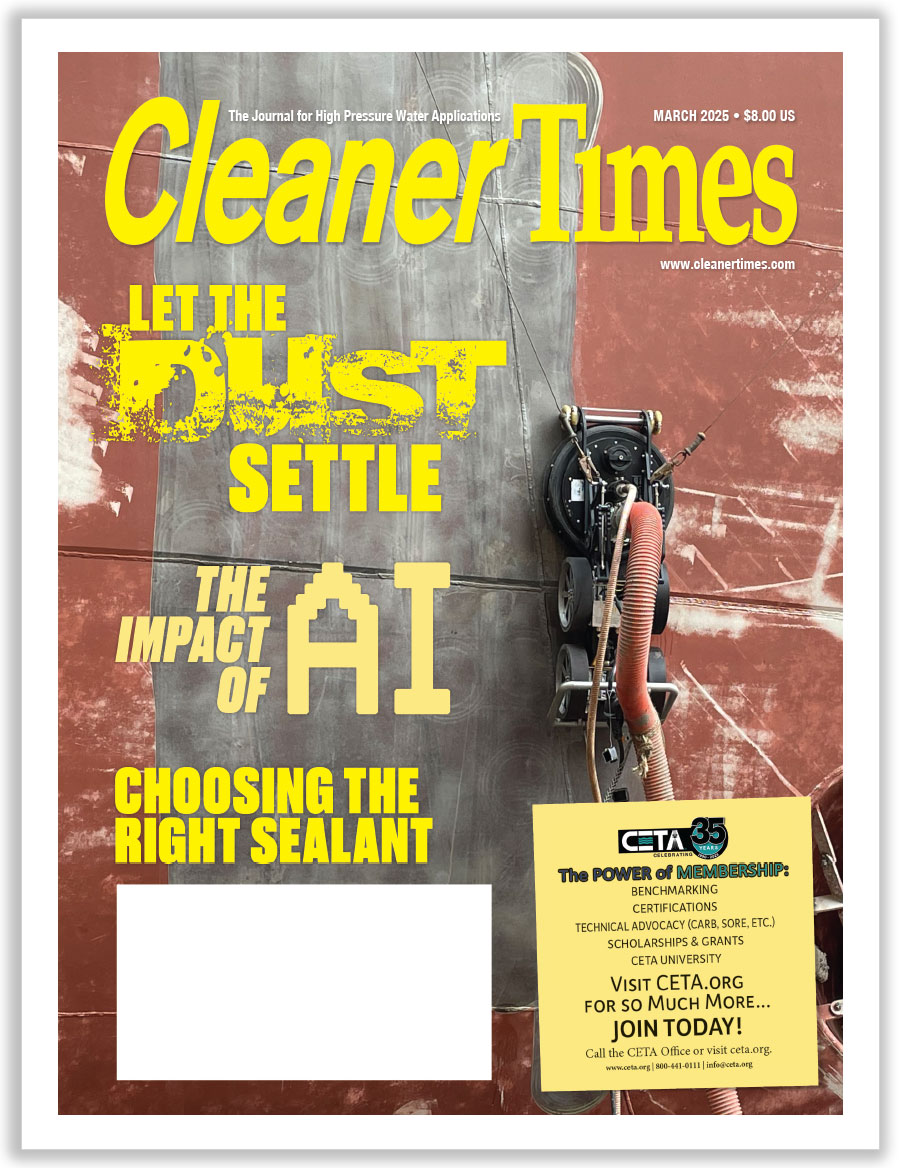
Financial
Year-Round Tax Savings
By Mark E. Battersby

Keeping the pressure cleaning operation’s tax bill low shouldn’t be a problem given the effects of the coronavirus pandemic on the economy. However, in order to keep the business’s tax bill low year after year requires planning, and what better place to start than in a troubled tax year?
One of the best tools for reducing taxes year round is the records maintained by the operation. Good records can help every pressure washing business generate an accurate tax bill and ward off zealous IRS auditors; but, that’s not all.
Good records are also invaluable for monitoring the troubled operation’s recovery, preparing financial statements required by lenders and investors, selling the business, and (especially) securing financing. (For a more detailed article on good recordkeeping, visit https://www.cleanertimes.com/magazine/cleaner-times-articles-2/records-save-them-protect-them-they-could-save-your-business-a-bundle.)
Those Dreaded, Basic Records
It should be no surprise that more deductions are disallowed by the IRS for lack of substantiation than for being nondeductible. But, while the IRS doesn’t require receipts for expenditures of less than $75, most tax rules do require many expenses to be documented—a chore in anyone’s book.
The IRS doesn’t require a pressure washing business to keep records in a particular manner. So long as the records produce an accurate accounting of income and expenses, the method best suited to the business can be used. Obviously, since every business will benefit from more rigorous and accurate recordkeeping, that can mean investing in the most effective and affordable recordkeeping system possible.
Sensible Spending
The old adage, “You have to spend money in order to make money,” got a shot in the arm several years ago when lawmakers increased the tax incentives for purchasing equipment and other business property. The 100 percent first-year “bonus” depreciation deduction generally applies to expenditures for equipment, vehicles, computers, and other business assets used in the pressure washing operation and were originally depreciable over 20 years or less.
What’s more, new guidelines were recently released by the IRS for businesses that want to take advantage of the current 100 percent write-off for equipment, fixtures, and even some real estate. Now, the IRS will allow any business that failed to take advantage of these accelerated write-offs to retroactively claim them.
In addition to the 100 percent bonus depreciation, the TCJA increased the unique first-year write-off for so-called Code Section 179 equipment and property. Thanks to an inflation increase, the Section 179 deduction for 2020 is $1,040,000. The deduction does, however, begin to phase out on a dollar-for-dollar basis after $2,590,000 is spent.
Although the write-offs under the TCJA are helping pressure cleaning businesses that have purchased new equipment defray out-of-pocket costs with significantly larger tax deductions in year one, it may not always be the best strategy for every pressure cleaning business—particularly in an off year.
After all, that immediate expensing deduction drops the book value or basis of the business asset to zero. And, then there is the question of what is the pressure washing operation going to deduct these write-offs from? Income and tax bills will likely be down this year, making additional write-offs more valuable in the future, more profitable years than depreciation deductions or more losses are this year.
Buy Versus Rent
As an alternative to the outright purchase of equipment or other business property, leasing has long been an option. As a general rule, it’s usually a good idea to buy small equipment and continuously needed hardware. Today’s tax laws and immediate write-offs also favor purchasing, at least for a pressure washing business that has the cash for a down payment and/or financing lined up. But, remember: new accounting rules require leases to be shown as a liability on the operation’s financial statements.
Selling it Off
Disposing of unneeded, unwanted, or obsolete equipment or other property deserves some thought as part of year-round tax planning. There is, after all, no point in letting excess equipment take up space when it could be contributing to the operation’s bottom line.
Selling, donating those unwanted assets to a charity, or actually abandoning them create cash and/or tax write-offs. Don’t forget to document each event, keep receipts, and physically abandon assets, not merely store them away.
Hiring and Firing More Than a Tax Issue
Every pressure washing operation faces employment issues and plenty of changes this year due to the impact of the coronavirus pandemic and higher labor costs for some operations.
As of January 1, 2020, a quarter of all states had higher minimum wages. There are also new federal overtime rules. And, don’t forget about California’s controversial new law for freelancers and others in the so-called “gig” economy, which is spreading the worker classification issue to still more states.
The IRS continues to challenge whether workers are employees or independent contractors. Independent contractors are not subject to withholding, relieving the employer of liability for payroll taxes. Workers, for their part, can avoid higher tax bills and lost benefits by knowing their proper status.
For those uncertain whether workers are classified correctly, the IRS can provide a determination letter telling how it views the operation’s workers as employees or independent contractors.
In addition to using IRS Form SS-8 to request a determination of worker status, employers can apply to the IRS if it has been erroneously classifying workers as independent contractors. This application for “530 relief” allows the operation to get relief from liability or payment if it has been classifying workers as independent contractors in error.
Now is the Time to Think About Tax Credits
Unlike a tax deduction that merely reduces the income upon which tax is based, a “credit” directly reduces the pressure cleaning operation’s tax bill. Taking advantage of tax credits may appear to be wasted in a year with a low or no tax bill, but they can be carried over to more profitable years or contribute to the operation’s net operating loss (NOL) to generate a refund of previously paid taxes.
Included among the most popular tax credits and the ones most likely applicable to a pressure washing business are these virus-related tax credits and other long-standing credits:
- Paid family and medical leave. Subject to certain limitations, the CARES Act included a payroll tax credit equal to 100 percent of the family leave wages paid by an employer.
- Payroll tax credit for required paid family leave. Similar to the paid family and medical leave credit, this credit equals 100 percent of the qualified sick leave wages paid by the employer.
- Self-employed individuals. Self- employed individuals were eligible for qualified family leave equivalent amounts and qualified sick leave equivalent amounts.
- Employee retention credit. Employers can claim this credit only if they have not received a PPP loan. This fully refundable tax credit is equal to 50 percent of qualified wages paid to employees. While both the Employee Retention Credit and the tax credits associated with paid leave can be claimed, they can’t be claimed on the same wages.
- Going green. Businesses, as well as homeowners, can benefit from a 26 percent energy investment tax credit on renewable energy systems. The federal solar tax credit permits a deduction for 26 percent of the cost of installing a solar energy system.
- A tax credit for builders of energy-efficient homes and tax deductions for energy-efficient commercial buildings have been extended through December 31, 2020.
- Access for the disabled customer or employee. A business can take an annual deduction for expenses incurred to remove physical, structural, and transportation barriers for people with disabilities. In fact, small businesses that, in the previous year, earned $1 million or less in gross receipts or had 30 or fewer full-time employees are eligible for the Disabled Access Tax Credit. Eligible access expenditures include the following:
- Removing barriers that prevent a business from being accessible to or useable by individuals with disabilities.
- Buying or modifying equipment or devices for individuals with disabilities.
- Small Employer Pension Plan Startup Cost Tax Credit: This small business tax credit is designed to offset the cost of starting a SEP, SIMPLE IRA, or a qualified pension plan. The credit is 50 percent of the cost of setting up and administering the plan and educating employees about the plan, up to $500 per year.
Find a Pro
Now might be a good time to shop around for a pro. While most pressure cleaning business owners and managers know their operation inside and out, there are highly technical matters of law, accounting, management, and marketing that are usually best handled by outside experts.
The first step to finding the right tax professional requires an inventory of what you—and your business—actually need in the way of services and advice and, most importantly, how much you can afford to pay for that advice or services. And, the best way to find someone to render needed advice or guidance is via a referral from business associates, your banker, or your attorney.
With or without help, maximum tax savings for 2020 and, hopefully, many years to come are possible with year-round tax planning. The first step should involve the pressure washing operation’s recordkeeping system or lack of one.






